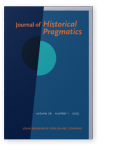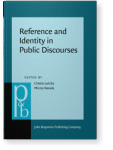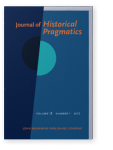Mel Evans
List of John Benjamins publications for which Mel Evans plays a role.
2019 “Right trusty and well-beloved”: The socio-pragmatics of gender, power and stance in sixteenth-century English letters Reference and Identity in Public Discourses, Lutzky, Ursula and Minna Nevala (eds.), pp. 67–96 | Chapter
The paper investigates how high-ranking early modern women letter-writers negotiated the social tension between their subordinate position as women, and their positions of power, in the linguistic construction of their epistolary identities. We focus on the letters of four Tudor women: Kathryn… read more
2017 Royal language and reported discourse in sixteenth-century correspondence Journal of Historical Pragmatics 18:1, pp. 30–57 | Article
This paper investigates the formal and functional dimensions of reported discourse in sixteenth-century correspondence. It focuses on how letter-writers report the utterances – spoken, thought and written – of high-status sources (namely, the king or queen), in order to assess how the early… read more
2017 “A graphic system which leads its own linguistic life”? Epistolary spelling in English, 1400–1800 Exploring Future Paths for Historical Sociolinguistics, Säily, Tanja, Arja Nurmi, Minna Palander-Collin and Anita Auer (eds.), pp. 187–213 | Chapter
Traditional accounts of the history of English spelling are primarily based on printed texts. According to them, English orthography developed from great diversity in Late Middle English to modern standard spelling by 1800. Studies have also revealed a split between public and private spelling… read more
2016 Chapter 3. From ornament to armament: The epistolary rhetoric of Lady Elizabeth Tudor Linguistics and Literary History: In honour of Sylvia Adamson, Auer, Anita, Victorina González-Díaz, Jane Hodson and Violeta Sotirova (eds.), pp. 49–70 | Article
Queen Elizabeth I is recognised as a monarch for whom language was an
essential tool in the construction of her authority and the maintenance of her
rule. This can be seen directly through her state communication e.g. parliamentary
speeches, or more indirectly in her activities in literary… read more




